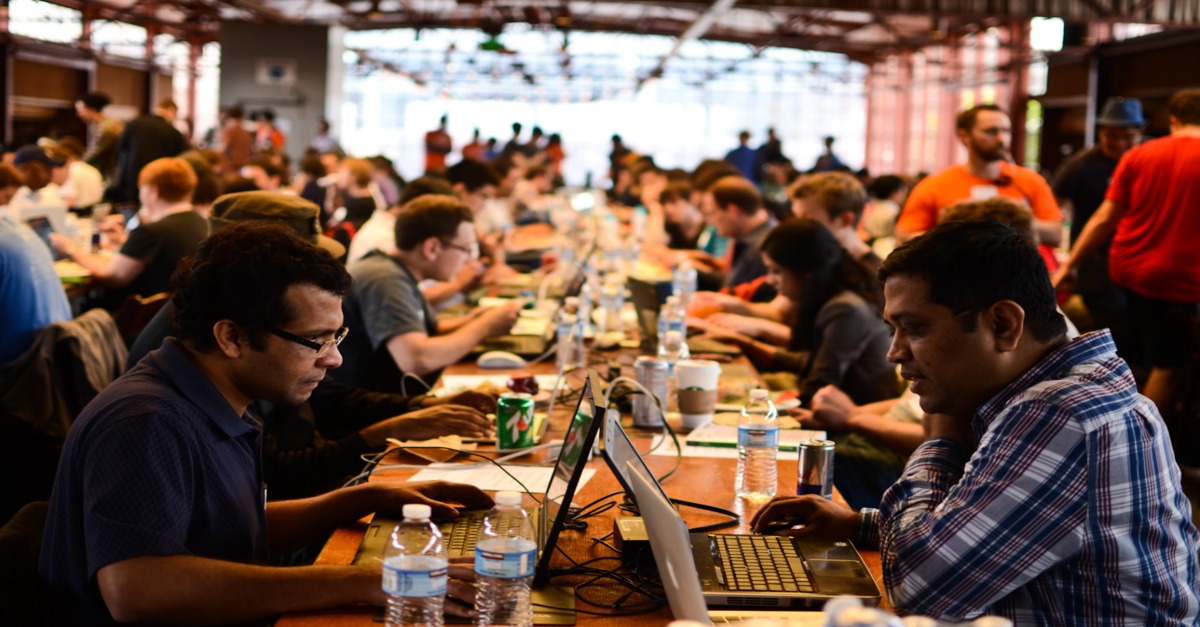“Hackathons? Aren’t those just for the tech industry?” I said to myself as I found out about the recent trend of corporate Hackathons.
Turns out that “hacking” isn’t just about bypassing internet security anymore, but about making ideas happen. With an emphasis on doing more than planning, corporate hackathons are all about results and is a great way for companies to spot talent.
Go to any corporate hackathon and you’ll see upwards of 100 people, most of them eager developers with ideas about how to help companies go digital.
In Singapore, these hackathons tend to be day events, with the idea-to-prototype stage occurring in a mere 2-3 hours.
“Corporate” Hackathons?

I looked around to find out about what corporate hackathons are like, and found a mixed bag of responses. Corporations were mostly pleased with the results of their hackathons, with a banking firm saying that the prototypes developed during the hackathon were “years ahead” of what they currently had.
Other responses were about IP concerns that developers had – one hackathon told contestants that they had to exchange the rights to their prototypes to get their prizes.
IP is the lifeblood of developers, and corporations expecting to benefit from hackathons cannot do so without helping the developers as well.
Nothing makes me feel more indignant when I hear stories of developers which allowed a certain idea to materialise, but are blindsided by their bosses who claim all the credit. Similarly, corporations organising hackathons should respect the IP of developers, and pay them like they would a software development firm.

After all, that’s what corporations are really using hackathons for. Imagine a day with a room full of creative people working to improve your company.
At the end of the day, the sheer amount of prototypes and ideas from people outside the company will help you see from an entirely new perspective. Big companies often stumble due to corporate inertia, and nothing is fresher than a new prototype just out from a hackathon.
Big Companies Going Big On Digital
When you think of the phrase: “think digital, and think big” – does Facebook, Alibaba, and Snapchat all come to mind?
These companies are all wildly successful because they are built for the consumers of today. Likewise, the big-but-older companies which want to emulate this success and remain relevant have to go digital.
The thing is, big companies, like Facebook, do have something that even developers don’t have – an emerging trend in corporate hackathons is the use of “Big Data”, or large sets of data that reveal patterns and trends of consumer behaviour. This truly allows the developer to build a prototype that is practically tailored for the modern world.

Complementing “Big Data” are the “Big Prizes” that corporations put out there to make developers worth their time. On one extreme of the spectrum is the “Battlehack” World Hackathon Championships organised by Paypal, which has US$100k in prizes.
Singapore is moving towards larger hackathons, but for now we have to be content with our smaller prizepools.
Corporate Hackathons In Singapore
The Data Challenge by Capitaland is a vague step in the right direction for Singaporean hackathons. I like the idea of giving developers employees to work together with as this will let developers have a better idea of what big companies want. Employees will also get a chance to experience working outside of a corporate structure.

One detail about the hackathon, though, does give me some cause for concern. The Data Challenge’s terms state that:
“By submitting a Contest Entry, each participant automatically and irrevocably grants to the Organiser an equal share of all intellectual property rights, title and interests (including copyright) in all materials submitted by the participant to the Contest, in all forms and media, and in all countries of the world, to be co-owned by the participant and the Organiser as tenants-in-common, with full rights to use, license, exploit and enforce the said intellectual property rights and to assign the above share of co-ownership, and without any obligation for the Organiser to account to the participant for any proceeds thereof.”
Legalese aside, the contradiction between “an equal share” and “without any obligation” really grinds my gears for what Capitaland really wants.
Although they have also offered the possibility of a job opening for participants, what do the developers who didn’t win stand to gain from Capitaland?
And is there really a need for corporations to hide behind such confusing terms and conditions?
Developers just want fair treatment, and they won’t necessarily start a company out of every hackathon prototype they make. Such conditions are problematic, and should be done away with to encourage creativity.
After all, it’s hard to put in effort when you know your work is going to be ripped out of your hands entirely.
Feature Image Credit: Hackout.ninja








